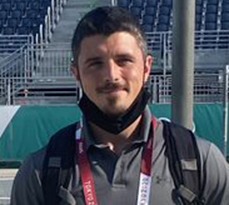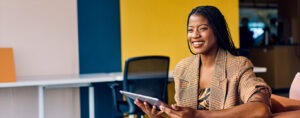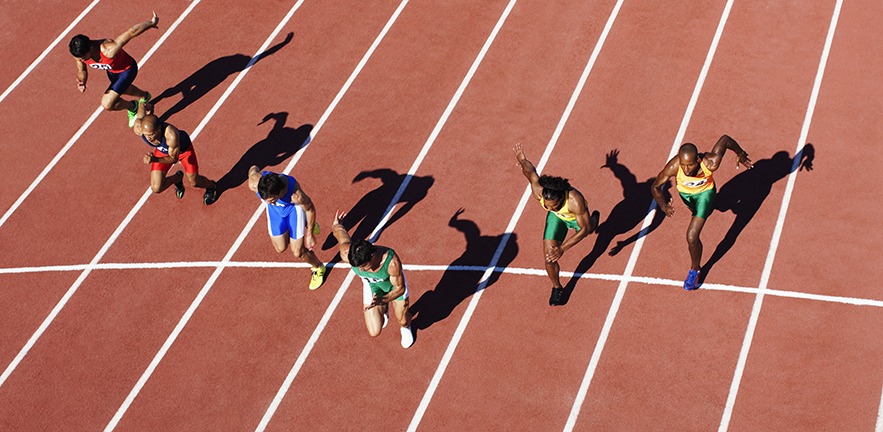Learning the art of negotiation at Cambridge Judge Business School helped Chris Spinello (MBA 2018) assist in securing The Olympic Partner (TOP) programme with Deloitte.

A former President of the International Olympic Committee (IOC) famously referred to each quadrennial event as “the best Olympic Games ever!” – a legacy that Chris Spinello, a Cambridge MBA graduate (2018), and his team take as a challenge as they prepare to support the IOC with its digital transformation strategy and working closely with future Olympic Host Cities. From his time at Cambridge Judge Business School Chris knew that superlatives are best used sparingly – and only if they can be firmly backed up.
Chris was a leading member of the bid (and now delivery) team for professional services firm Deloitte as they set out to secure a decade-long partnership to provide management and business consulting services, including digital strategy and transformation for the Olympic and Paralympic Games starting with the Milano-Cortina 2026 Olympic and Paralympic Games through to the Brisbane 2032 Olympic and Paralympic Games.
Chris credits the negotiation skills he learned at Cambridge Judge with helping secure the contract.
Why in business, as in sports, being coachable is key
“Relationship building goes a long way – whether you’re remote or in person – understanding the humanity that sits across the table from you is so important,” says Chris, a life-long athlete who played lacrosse for University of Cambridge while studying at Cambridge Judge. “We [Deloitte] were as open and honest as we could be. We couldn’t say we had ever delivered the ‘greatest Games’ because we hadn’t – but what we did have was a common goal and interest – and our core mission of the Games is to “build a better world through sport”. What we could say and aspire to was being totally committed and coachable. Every day, we committed to come to the table and be coached and improve every day, just like an athlete.”
Chris, a 34-year-old originally from Boston, Massachusetts, started out as a systems integrator in the US, moved into technology strategy delivering transformative technology in over 20 different countries across the globe prior to pursuing his MBA at Cambridge Judge. Now based in the technology hub of Austin, Texas, he says negotiations to partner with the International Olympic Committee and future Organizing Committees for the Olympic Games (OCOGs) lasted more than 2 years and covered a diverse set of topics and commitments such as core delivery, sustainability, diversity, equity, and inclusion.
A shared vision of a diverse and equitable future
“When I look at the mission of the Olympic and Paralympic Games and what the Movement strives to do, that’s a world I want my son and now my daughter to grow up in – a world which is diverse, which is equitable, which is inclusive for them.” His pride about working on the project is palpable: “This was the first time I was able to turn to my father in my 12-year career as a consultant and say: ‘Hey, I’m working on the Olympics’ – and for him to understand what I did.”
The bidding process took place remotely due to the pandemic, with up to 200 people at a time dialling in, making it harder to exchange soft-touch pleasantries and judge reactions. Despite this challenge, the affinity Chris developed with the IOC team meant he progressed from being a lead member of the initial response team, to a lead member of the negotiation team, and finally to a leader in the delivery team. He is now Senior Manager at Olympic, Paralympic and Major Events business at Deloitte.
Strategy, negotiations and relationship building on the Cambridge MBA
Chris credits Cambridge Judge faculty Mark de Rond, Professor of Organisational Ethnography, and Lionel Paolella, Associate Professor in Strategy and Organisation, for their teachings on the MBA programme.
“If you’d thrown me into this negotiation process without having worked with these professors and leaders I think I would have really struggled to understand where the IOC was coming from or even my own leaders sometimes,” Chris says. “You’re hardwired not to negotiate, but to barter like a car salesperson would, pushing your own agenda, rather than building relationships and understanding what the other side needs. Professor de Rond said it on the first day of class and I’ll never forget it ‘People don’t come to the negotiating table for your reasons, they come for their reasons – it’s your job to figure out what they are.’”
Hundreds of people were responsible for delivering the bid, and Chris stresses the need for teamwork. “Just as you would in sports, you must rely on your team to get the job done. You need organisational clarity about what the objective is. In soccer it’s put the ball in the net – and you spend most of your time without the ball, so you move to open space, create opportunity for others and when your time comes, execute. In a negotiation, the goal is always understand the core need, not just the stated need, and respond in kind.”
Why it’s important to remember everyone has something to teach you
The negotiations also reinforced other key takeaways from the MBA for Chris: align yourself with good leaders and a mentor.
“I’ve been very fortunate with the leaders that have helped me grow during this process,” says Chris. “No one gets it done alone. I was part of a big team, at every interaction my goal was to learn something, and I did from my seniors, juniors and peers. “I think that is also a key to the Cambridge MBA experience. The group is diverse, but all the people on the programme have something in common, they are all incredibly well accomplished. When you first walk in, you feel like maybe the admissions team made a mistake, but you quickly realise that your admission wasn’t a mistake and most people in the room feel the same. So, if you walk into the MBA thinking that every person there doesn’t have something to teach you, you’re going to miss out on some amazing lessons and you’ll squander the MBA opportunity as well as other opportunities long after that.”


